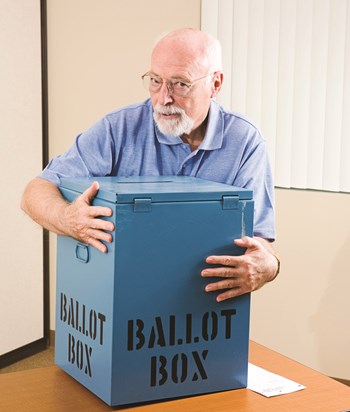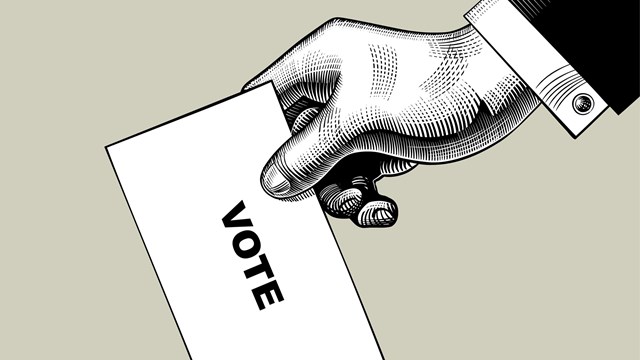
Every co-op, condo, and HOA must elect a board of directors to oversee the community’s finances, physical maintenance, and other day-to- day operations. While board elections don’t rise quite to the level of a state or even local election in terms of gravitas, an apathetic or inept board can profoundly impact the cohesion and quality of life in a given building or association— and a truly bad board can run a community into the ground. Given the high stakes, it’s crucial that board elections be carried out properly and fairly. How can board election fraud be prevented? And how it can be detected—and corrected—when it does occur?
In the News
The issue of widespread election fraud in condominiums and HOAs came to the forefront recently in Florida when it was discovered that at least 30 percent of the common interest communities in Miami-Dade County regulated by the Florida Department of Business & Professional Regulation (DBPR) were the subject of complaints or were actually being investigated for committing some kind of election fraud or administrative irregularity.
In an investigation by The Miami Herald and Univision, multiple HOAs in Florida were accused of forging ballots, casting duplicate ballots, intimidating owners to change their proxies, and attempting to cover up the voting irregularities.
Understanding the Process
Before we delve into the muddy waters of fraudulent elections, we must first understand how the election process is supposed to work.
“Almost every community association that I’ve dealt with or represented has a provision in its bylaws that dictates and spells out that there shall be an annual meeting at which the directors, if it’s a homeowner’s association or a co-op, or the members of the board of managers if it’s a condominium, are elected,” explains Marc Schneider, Esq., founding partner of the law firm of Schneider Mitola with offices in New York City and Long Island. “And it usually spells out some of the procedures for doing so, such as the amount of notice that you have to give to the residents. For example it might say something like, ‘not less than ten or more than thirty days.’”
One way an election could be rigged, then, is by skipping the annual meeting—sort of like how dictators of banana republics decide to not have elections, or postpone them indefinitely. If your building hasn’t had an annual meeting in the last 12 months, there may be an issue.
Fortunately, good governing documents have provisions for when any shady business goes down. “Some governing documents will actually tell you that a meeting needs to be held at a particular time of the year, such as the first week of a particular month,” Schneider says. “Now if a community doesn’t call an annual meeting, the remedy is to go to a court to compel them to call an annual meeting.”
“It’s very important, particularly for amendments where the quorum requirements are fairly high, that people know when meetings are going to happen as far in advance as possible,” says Scott McKeel, president of Vote HOA Now, a national online voting service for community associations based in Oregon. “In my experience, the problem is a lack of communication from the manager’s or the board’s standpoint. It’s one of the biggest reasons for not meeting quorum requirements. There are certainly a lot of communities that just won’t participate no matter what, but in general, communication is good.”
Trustworthy Bedfellows
The more an association relies on impartial players without vested interest in the outcome of its elections, the more likely those elections are to be determined fairly. Having an attorney or other outside professional look over the language as pertains to voting rules can go along way toward both ensuring fairness and putting ownership at ease in regard to same.
“In my experience, most associations, particularly those of a certain size, will have a property manager who‘s in charge of sending out proxies and ballots,” explains Anne P. Ward, an attorney with the law firm of Ehrlich, Petriello, Gudin & Plaza, which has offices in Newark, New Jersey, Morristown, New Jersey and New York City. “And they’ll frequently ask me for help, at least in the drafting process. I also always advise my clients to send election notices by certified regular mail, even if that’s not required by bylaws, because then you have a paper trail. Then, sometimes I’ve been asked to attend the annual meeting and act as a witness, or count along with moderators, and that adds another layer of professionalism supervising the count.”
One of the most important aspects is ascertaining who does and does not have a right to vote in an election, as there are almost always stipulations—many dues-related—that can lead to said right being revoked. “I always urge associations to maintain a full list of who’s entitled to vote,” confirms Ward. “For instance, most bylaws—if not all, in my experience—specify that, should an owner not be up to date on their payments, they waive their right to vote. So the first thing you have to do at a meeting is determine who’s entitled to vote, whose vote can be counted. And those who can must make sure that their proxies are filled out properly. If a counter gets a proxy wherein the vote is ambiguous, it can’t be counted. Or if something just isn’t filled in, that proxy is out.”
No-Shows
Most buildings have a process in place whereby unit owners can vote without having to be physically present at the meeting. Sue in 2B might decree that Jeff in 7A will cast her vote for her. This is called voting by proxy.
“The other thing that a lot of community associations do now is that they will actually solicit the candidates for those seats in advance, establish a deadline so that when the notice goes out it will tell people who the candidates are and they can then prepare the appropriate proxy, so that people can vote on that proxy,” says Schneider. “They can vote on that document for the candidate of their choice, as opposed to somebody getting up and being nominated from the floor and people don’t know who’s running. And then you don’t necessarily have everybody that’s there, and you might wind up with the election’s outcome being very different than what they might otherwise be.”
The proxy system is a convenient way to meet quorum on votes. But it is the main avenue by which elections may be rigged.
“I actually had a co-op where they used a proxy ballot, and the person who collected the ballots from the individuals decided that it was their prerogative to change the votes that the people cast on the proxy ballots,” Schneider recalls. “And it was very apparent, so it was caught on the night of the election when all of the documents came in. Obviously the election had to be adjourned and re-voted.”
There are different ways to use proxies. “You can have a general proxy, and that gives the person that you give a proxy to the right to vote for whoever they want,” Schneider says. “But if you have a directed proxy, or proxy ballot, where the person is giving specific instructions to the proxy holder to cast their vote in a particular manner, you can’t change it.”
The Treasure of Online
On its face, rigging an election for board seats on a co-op or condo board may seem trivial. But board members, especially in bigger buildings, hold the purse strings to a very well-stocked purse.
“For each community, we set up a voting website with its own database,” says McKeel. “It can be used for smaller communities; the smallest one we have is about forty homes. I think the largest one we have is about ten thousand homes.”
Online systems have several distinct advantages. “First off, everybody these days wants to be able to vote through their phones and computers, so you get people who won’t show up at the meetings, who won’t participate, who might not even take the time to fill out a paper ballot and return it. I mean, that takes work, right? You gotta walk it to the mailbox. So voting online like this takes them a couple minutes.” With online voting, he says, managers know they are making quorum nine times out of ten, before they even get to the meeting.
“The other advantages are that the voting results are accurate,” he says. “There’s no recounting an electronic vote because the computer does the math, and it doesn’t make a mistake. And it’s harder to commit fraud with the electronic voting. If somebody wants to stuff the ballot or sway the board, or sway an election… most HOA paper ballots or proxy ballots are just forms that can be copied and reprinted out. So it’s pretty easy to send in forms that aren’t necessarily yours.
“And another big problem I’ve heard about with some elections is that you might have a board in that wants to stay in. So they’ll go around and collect proxies from people, and use intimidation,” says McKeel. “So with the electronic voting, you kind of take that away. And there’s no stuffing the ballot box, because every homeowner has to have a unique registration code. So if somebody were to give their registration code out, similarly to someone collecting proxy forms, the person who uses them would have a separate email address, and if they didn’t the email failure messages would alert us to the fact that this is going on.”
“The few associations, to my knowledge, that are voting online are not doing so directly, with ballots going to the management company,” adds Stephen Marcus, a partner with the law firm of Marcus, Errico, Emmer & Brooks, P.C. in Braintree, Massachusetts. “The ballots are instead going to a third party company. So I’d recommend getting input from different associations as to the quality of a particular voting company before hiring one. The upside is that if one of such company gets caught even once doing something unethical, it would hurt its reputation down the line.”
“But while some people still like attending meetings, I think that there will be a trend in the future toward online voting,” Marcus continues. “A lot of millennials would rather go online, fill out a proxy and a ballot, and it will mostly come down to the online voting companies—these third parties—to maintain an upstanding reputation and offer the most secure platforms. I’d be wary of an association whose online voting goes directly to a management company.”
Truth & Consequence
Of course, despite ample safeguards, fraud would find a way to exist, especially in a vacuum sans consequences. Fortunately, those who try to perpetuate skullduggery are punished to an extent that it hopefully discourages them from doing so preemptively.
“The most common remedy is to have an offending party removed from a board,” says James R. Stevens, a principal with the law firm of Chuhak & Tecson, P.C. in Chicago, Illinois. “In Illinois, condominium and HOA board members are subject to the provisions of the Not-for-Profit Corporation Act, so there are some avenues to remove a director for cause if you approach the circuit court, but that happens rarely. Nine times out of ten, I would say, owners get together and vote to remove the property manager.”
Of course, there are cases wherein the ownership or shareholders suspect that the property manager was involved in nefarious dealing as well. “Disgruntled owners or board members will on occasion say that [election fraud] was the property manager’s fault,” concedes Stevens. “In Illinois, property managers are licensed professionals, and are thus subjected to inquiry and discipline from a state body—the Illinois Department of Financial & Professional Regulation—so owners could approach that body to investigate. But, for the most part, we have not seen property managers step in and try to engage in shady business to try and further someone else’s cause.”
Transparency is the watchword with local elections. If a board is doing its diligence, it should take no umbrage with letting its constituents in on every step of the process. And when considering a new method of voting, be that electronic or otherwise, a board is advised to seek recommendations from similar associations, to best ascertain which third-party service or system is most secure for its needs.
Greg Olear is a freelance writer and a frequent contributor to New England Condominium. Staff writer Mike Odenthal also contributed to this article.









Leave a Comment